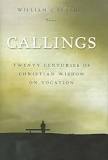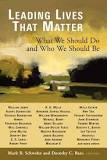 In modern North America, the question “What am I supposed to do with my life and why?” is both focal and vexed. Our pragmatic society focuses on work and career so much that our first question on meeting a new friend is “What do you do?” Given this national obsession, it would be reasonable (but wrong) to expect North Americans to drink deeply from centuries of reflections about this thing called “work.”
In modern North America, the question “What am I supposed to do with my life and why?” is both focal and vexed. Our pragmatic society focuses on work and career so much that our first question on meeting a new friend is “What do you do?” Given this national obsession, it would be reasonable (but wrong) to expect North Americans to drink deeply from centuries of reflections about this thing called “work.”
But we know this is not the case. The pragmatic impulse hurriedly sweeps by all deep questions and philosophical meanderings, rushing down the straight and narrow path to getting stuff done. Our pragma itself (Greek for “business” or “thing done”) prevents us from asking the “why” questions.
 Unavoidably, we do live out our jobs and careers with the aid of a philosophical basis (even if it is an unexamined one). The term “vocation” has now taken on secular freight — standing simply for our career or our work. But in the pre-Reformation West, “vocation” (or “calling”) meant a dedication of life to the self-disciplined contemplation of God — to the near exclusion of secular employments. During capitalism’s incubation, the Reformers enlarged the term “vocation” to a new meaning: they insisted that in whatever sphere of labor, God calls people for a particular work. From then on, a rich tradition of meditation on vocation multiplied within the church. Yet much of this wisdom is virtually unknown today.
Unavoidably, we do live out our jobs and careers with the aid of a philosophical basis (even if it is an unexamined one). The term “vocation” has now taken on secular freight — standing simply for our career or our work. But in the pre-Reformation West, “vocation” (or “calling”) meant a dedication of life to the self-disciplined contemplation of God — to the near exclusion of secular employments. During capitalism’s incubation, the Reformers enlarged the term “vocation” to a new meaning: they insisted that in whatever sphere of labor, God calls people for a particular work. From then on, a rich tradition of meditation on vocation multiplied within the church. Yet much of this wisdom is virtually unknown today.
Two books, four questions
Responding to this vocational amnesia come two books that serve as companion anthologies of source materials on the subject — William C. Placher’s edited volume Callings: Twenty Centuries of Christian Wisdom on Vocation, and Mark R. Schwehn and Dorothy C. Bass’s edited volume Leading Lives That Matter: What We Should Do and Who We Should Be. Placher takes a chronological approach, presenting a set of primary sources from Ignatius of Antioch (in the first century) to Karl Barth (in the 20th). Schwehn and Bass, on the other hand, proceed topically, surveying mostly modern thinkers both within and outside of the church — from Albert Schweitzer and Theodore Roosevelt, to Dorothy Sayers and Robert Frost, to ethicist Gilbert Meilaender and the Matt Damon/Ben Affleck screenplay of Good Will Hunting, with a sprinkling of biblical and classical sources along the way. Both books share the goal expressed by Schwehn and Bass in their introduction: “to lead readers to know their own minds better by encountering the minds of others who have gone before them.” In fact, Schwehn and Bass differ most from Placher in this respect: they seek to lay out the inner logic and vocabulary of how Christians have historically thought about vocation. Part 1 argues that this historical conversation has used three distinct vocabularies to talk about what it means to live a significant life — that is, vocabularies of “authenticity and individualism; virtue and character; vocation and the divine.”
Christian conversation about this is grounded first and foremost in Scripture, even if the Bible seems to say little, at least directly, about the matter of vocational callings. But within this spare witness we can include two passages in Genesis. In the first, Adam is placed in the garden “to till and keep it” (Genesis 2:15) — this implies, as Placher says, that “there is work to be done and human beings are to find meaning and fulfillment in serving God’s pleasure by doing it.”
Of course, the fall injects a darker note, and the second Genesis passage (beginning with 3:17) frames work as punishment, with Adam now able to eat only in toil and by the sweat of his face. What are we to conclude from these texts? Perhaps only what our experience also tells us: that “work can be both blessing and curse,” as Placher tells us — “the task that fulfills us and gives our lives meaning in the service of God or the burdensome job we endure to put food on the table for our families.”
Other Old Testament texts have been used by Christians meditating on work and its meaning. Gregory the Great famously compared the active life — our workaday tasks, including those done out of love of others, for the common good — with the “blear-eyed” and fruitful Leah (Genesis 29:17). The contemplative life, on the other hand — the quest for intimacy with God that monks and mystics through history have pursued — Gregory compared with Leah’s clear-seeing but sterile sister Rachel. Work produces visible results but obscures from us the spiritual truths of things, while contemplation and prayer, while short on immediate, visible results, provide us with precious insights. On this matter, as on so many others, pragmatic North American Christians find themselves over-Leahed and under-Racheled.
In the New Testament, the term klesis (“calling”) is used almost always to refer to the calling to faith — to be a Christian. Although it does not use the term “call,” one passage does seem to cast light on the status of our work on earth: “Whatever your task, put your selves into it, as done for the Lord and not for your masters” (Colossians 3:23). This passage has received much attention in subsequent Christian discussions of vocation, but it’s still a thin basis on which to proceed. It looks like this matter of vocation is yet another place where Christians must supplement the biblical witness by listening to the centuries-long conversation of the church. Hence the need for books such as these.
Secular work as divine vocation
Both books provide ample food for thought on this important topic of vocation, including reflections both on what the Puritans, modifying an idea of Calvin’s, called our “general” vocations (to be disciples of Christ) and on our “particular” or “special” vocations (to do whatever work we end up pursuing). Most illuminating to me is the wealth of material on how secular work can be understood as divine vocation.
Many of the questions that people called to secular work may ask themselves are addressed in these volumes:
- How can I know I am called to work with God in these secular settings and discover my own particular calling there?
- How can I know I am called to work with God in these secular settings and discover my own particular calling there?
- How can I navigate the special temptations and rewards of a secular calling, to pursue it in a God-honoring way?
- In particular, what are the special temptations and rewards of a calling to a secular vocation, and how can I navigate them?
Thomas Merton’s prayer
“My Lord God, I have no idea where I am going. I do not see the road ahead of me. I cannot know for certain where it will end. Nor do I really know myself, and the fact that I think that I am following your will does not mean that I am actually doing so. But I believe that the desire to please you does in fact please you. And I hope I have that desire in all that I am doing. I hope that I will never do anything apart from that desire. And I know that if I do this you will lead me by the right road though I may know nothing about it. Therefore will I trust you always though I may seem to be lost and in the shadow of death. I will not fear, for you are ever with me, and you will never leave me to face my perils alone.”
A version of this article appeared in In Trust in 2010. This version originally appeared at Grateful to the Dead. ![]()











